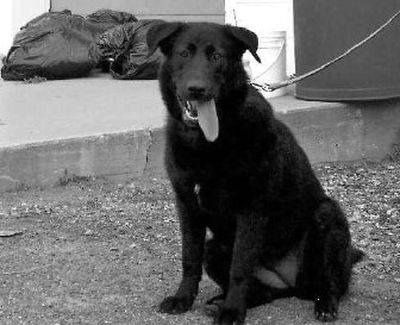Geiger inmates train pound pooches

“They all deserve second chances,” Sgt. Kim Lytle said of the graduates of the first FIDO program at Geiger Corrections Center.
The five graduates of the Federal Inmate Dog Opportunities program were former pound pooches from the local SCRAPS agency.
Lytle is the brains behind FIDO. She also works part time as a Spokesman-Review correspondent writing the Feature Creature for the North and South editions of Your Voice.
The inmate handlers are excited about the program and its rewards. Not only do the dogs get a second chance to prove themselves, but so do the inmates.
Nancy Hill, director of the Spokane County Regional Animal Protection Service, embraced FIDO wholeheartedly.
“She said, ‘Whatever you need from us, you let us know,’ ” Lytle said. “It’s a great partnership.”
Volunteer trainers help select the FIDO canines.
“We do look for dogs that sit quietly at their kennel door – that’s a strong point,” Lytle said.
The trainers teach training techniques to the inmate handlers every Wednesday at Geiger Corrections Center.
Then, throughout the week, the handlers reinforce the training and are responsible for their dogs. The dogs stay with their handlers during the day and sleep at night in crates in their handlers’ rooms.
The first program was five weeks, and the dogs were put through the paces of learning such things as to sit, stay, come when called, act appropriately in crowds, meet and greet, and walk on a loose leash.
“Everybody passed their canine good-citizen test on the first go-round,” Lytle said.
Upon completion of the program, the dogs are ready for adoption. Three of the five graduates were adopted before training ended, but Bo and Maggie still are looking for homes.
“Maggie is a super dog,” Lytle said. “She’s absolutely phenomenal with other dogs, and she’s great with people. She’d be good with kids.”
Maggie is a black Labrador mix. “Black dogs are often overlooked,” Lytle said. “Maggie is nondescript until you get to know her. Then she’s absolutely phenomenal.”
“Bo is absolutely beautiful. He’s one of those dogs that is very attuned to his handler’s moods,” Lytle said.
Bo would do better in a home with no children.
“But certainly, a quiet owner with a bit of dog experience will be the one whom he’ll bond with. He’s got all his behavior skills, (is) crate-trained and has his 10 points of good-citizen skills,” Lytle said as she patted the eager-to-please Bo.
The adoption process is easy. The application can be downloaded from the FIDO link on the SCRAPS Web site.
After the application has been approved, volunteers make a home visit.
“We don’t allow the dogs to be tied up,” Lytle said. “There has to be a fenced yard or a dog run and plenty of opportunity to exercise if the dog is in a run.
“The adoption fee is $225,” Lytle said. “We reimburse SCRAPS $75, which is its adoption fee, and we take the rest and put it into the fund.”
Through donations and adoption fees, Lytle is accumulating an emergency medical fund.
Lytle’s vision for the FIDO program is far-reaching.
“Eventually, we hope to add grooming, and there’s a big request from the staff to have a doggy day care so they can bring their dogs and train them,” she said.
“We’re also working with the superintendent in Medical Lake, and then they’ll partner with the Humane Society. Then we would like to be at Martin Hall, which is a juvenile state facility, to partner with SpokAnimal, and then we’ll have a coalition,” Lytle said.
It’s obvious the dogs are benefiting from this second-chance experience, but so are the Geiger inmates.
“One of the goals and missions we talked about is that we use positive reinforcement in the training. The whole power of positive reinforcement is a skill and a life lesson that we pass on to the handlers,” Lytle said.
By far the hardest part of the FIDO program is when the handlers have to say goodbye to their dogs.
“Knowing that we get the opportunity to save another one is awesome,” one handler said.
“The women have put a lot of themselves into these dogs, and we’re committed to being very careful about the homes we put the dogs in,” Lytle said.
Asked what happens if a home can’t be found, Lytle said, “That’s not an option. We’ll step up our marketing, get their names and pictures out there, take them to PetsMart.”
So, there’s a way to find a home somewhere?
“Absolutely,” Lytle said with a smile.